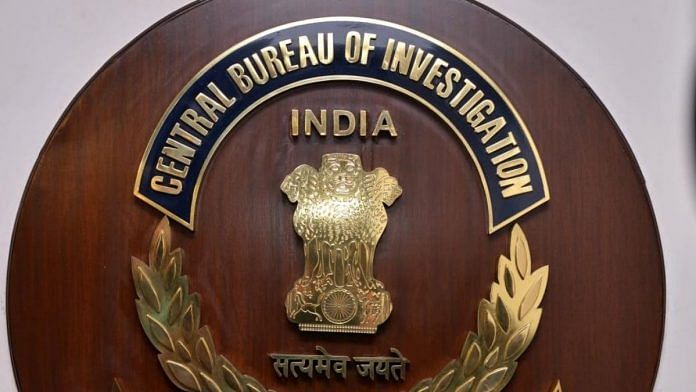New Delhi: With more than 1,000 cases pending investigation in the Central Bureau of Investigation, a parliamentary committee in its report Thursday asked the agency to undertake “cadre restructuring” at the earliest, to ensure cases don’t pile up. Sixty-six of the pending cases have been awaiting investigation for more than five years.
The committee also recommended that CBI makes efforts to reduce its dependence on deputation, and recruits permanent staff at least up to the rank of deputy superintendent of police, to tackle pendency.
The Rajya Sabha standing committee on Personnel, Public Grievances, Law and Justice said in its report that “delayed justice is no justice at all and cases cannot linger on without a definite closure for decades”.
According to the report tabled in the Parliament Thursday, as of 31 January, 2022, a total of 1,025 cases are pending investigation with CBI, of which 66 cases have been pending for more than five years.
The committee, headed by BJP’s Rajya Sabha MP Sushil Kumar Modi, in its report suggested that this pendency can be effectively reduced if the “manpower requirements are taken care of”.
“The committee recommends that CBI may prepare a roadmap for disposal of cases pending with them and inform the committee accordingly,” the report said.
‘Withdrawal of general consent — a concern’
The committee also raised concerns over several states withdrawing their general consent to CBI to register FIRs and start investigations, and asked the agency to give them details of the same.
The powers of the CBI are defined under the Delhi Special Police Establishment Act. While Section 5 of the Act states that the CBI’s jurisdiction extends to all states, according to Section 6, the CBI can probe or conduct raids only with the consent of the concerned state government.
“The Committee may be furnished with details of states that have withdrawn their general consent as on date and also whether such states have granted specific consent in certain cases,” the report said. “The committee also desires to have details of the number of cases in which the states have refused to give consent to CBI for investigation and the number of cases in which specific consent has been given by states,” it added.
The CBI had earlier said that there are around 100 “high-value fraud cases that could not be registered due to non-accordance of specific consent by some states”.
According to CBI sources there were over 100 complaints of fraud — including those of bank fraud and corruption — from across states, including Maharashtra, Chattisgarh, West Bengal, Rajasthan and Punjab, involving over Rs 20,000 crore. But cases have not been registered because the states have not yet given their consent to start a probe, the source added.
The eight states that haven’t given consent for the CBI to probe cases on their turf are Maharashtra, Punjab, Rajasthan, West Bengal, Jharkhand, Chhattisgarh, Kerala, and Mizoram. All except one — Mizoram, where the ruling Mizo National Front is an NDA ally — are led by parties in opposition to the BJP.
Further, the committee also sought year-wise details of number of cases and complaints registered with CBI, number of cases pending and the period for which they have been pending. Details of number of cases pending investigation, number of cases pending trial, number of cases that have completed trial, percentage of conviction vis-a-vis acquittal, were also sought.
‘Pending sanction for prosecution’
The committee’s report also mentioned that in as many as 72 vigilance cases — including those involving serious allegations — are pending sanction for prosecution beyond the stipulated time limit of three months.
The report said that this delay has become a “routine affair” and recommended that the Central Vigilance Commission (CVC) be empowered to take necessary action in such cases.
“The Committee is strongly concerned to note that not granting sanction for prosecution within the stipulated time limit has become a routine affair,” the report said.
“Therefore, the committee recommends the government to amend the relevant provisions and empower CVC to take necessary action in such cases where the competent authority fails to grant sanction for prosecution within stipulated time limit without valid reasons,” it added.
The report also noted that a large number of complaints are pending with central vigilance officers.
“As per the annual Report of CVC, during the period Jan 2020 to Dec 2020, 569 complaints received by CVOs through CVC and 11,693 complaints received directly by themselves are pending for more than the stipulated period of three months with them and some complaints are pending for over three years,” the report said.
“The Committee would like CVC to apprise it as to why such a large number of complaints are pending with CVOs and why the stipulated timelines are not being adhered to,” it said.
(Edited by Poulomi Banerjee)
Also read: ‘Who’ll probe murky affairs between echelons of power?’ Why SC handed Param Bir case to CBI



